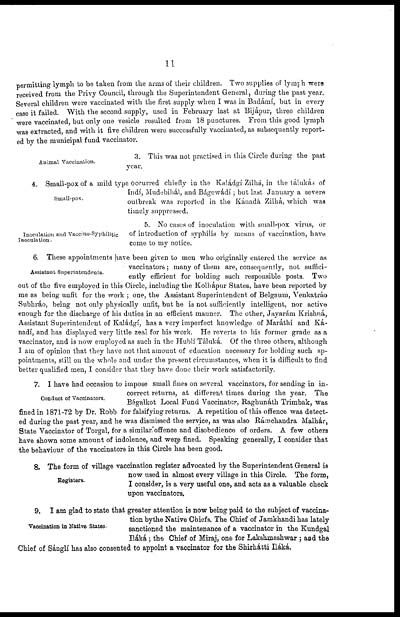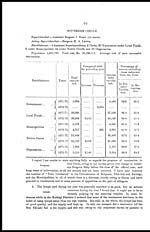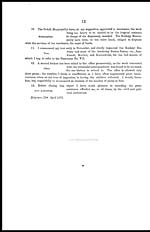Medicine - Vaccination > 1856-1876 - Report on vaccination throughout the Bombay Presidency and Sind > Vaccination in Bombay 1869-1873 > 1872-1873 - Report on vaccination throughout the Bombay Presidency and Sindh for the year 1872-73
(573) Page 11
Download files
Individual page:
Thumbnail gallery: Grid view | List view

11
permitting lymph to be taken from the arms of their children. Two supplies of lymph were
received from the Privy Council, through the Superintendent General, during the past year.
Several children were vaccinated with the first supply when I was in Badámí, but in every
case it failed. With the second supply, used in February last at Bijápur, three children
were vaccinated, but only one vesicle resulted from 18 punctures. From this good lymph
was extracted, and with it five children were successfully vaccinated, as subsequently report-
ed by the municipal fund vaccinator.
Animal Vaccination.
3. This was not practised in this Circle during the past
year.
Small-pox.
4. Small-pox of a mild type occurred chiefly in the Kaládgí Zilhá, in the tálukás of
Indí, Mudebihál, and Bágewádí; but last January a severe
outbreak was reported in the Kánadá Zilhá, which was
timely suppressed.
Inoculation and Vaccino-Syphilitic
Inoculation.
5. No cases of inoculation with small-pox virus, or
of introduction of syphilis by means of vaccination, have
come to my notice.
Assistant Superintendents.
6. These appointments have been given to men who originally entered the service as
vaccinators; many of them are, consequently, not suffici-
ently efficient for holding such responsible posts. Two
out of the five employed in this Circle, including the Kolhápur States, have been reported by
me as being unfit for the work ; one, the Assistant Superintendent of Belgaum, Venkatráo
Subhráo, being not only physically unfit, but he is not sufficiently intelligent, nor active
enough for the discharge of his duties in an efficient manner. The other, Jayarám Krishná,
Assistant Superintendent of Kaládgí, has a very imperfect knowledge of Maráthí and Ka-
nadf, and has displayed very little zeal for his work. He reverts to his former grade as a
vaccinator, and is now employed as such in the Hublí Táluká. Of the three others, although
I am of opinion that they have not that amount of education necessary for holding such ap-
pointments, still on the whole and under the present circumstances, when it is difficult to find
better qualified men, I consider that they have done their work satisfactorily.
Conduct of Vaccinators.
7. I have had occasion to impose small fines on several vaccinators, for sending in in-
correct returns, at different times during the year. The
Bágalkot Local Fund Vaccinator, Raghunáth Trimbak, was
fined in 1871-72 by Dr. Robb for falsifying returns. A repetition of this offence was detect-
ed during the past year, and he was dismissed the service, as was also Rámchandra Malhár,
State Vaccinator of Torgal, for a similar offence and disobedience of orders. A few others
have shown some amount of indolence, and were fined. Speaking generally, I consider that
the behaviour of the vaccinators in this Circle has been good.
Registers.
8. The form of village vaccination register advocated by the Superintendent General is
now used in almost every village in this Circle. The form,
I consider, is a very useful one, and acts as a valuable check
upon vaccinators.
Vaccination in Native States.
9. I am glad to state that greater attention is now being paid to the subject of vaccina-
tion bythe Native Chiefs. The Chief of Jamkhandi has lately
sanctioned the maintenance of a vaccinator in the Kundgal
Iláká; the Chief of Miraj, one for Lakshmeshwar ; and the
Chief of Sánglí has also consented to appoint a vaccinator for the Shirhátti Iláká.
Set display mode to: Large image | Zoom image | Transcription
Images and transcriptions on this page, including medium image downloads, may be used under the Creative Commons Attribution 4.0 International Licence unless otherwise stated. ![]()
| Permanent URL | https://digital.nls.uk/91027325 |
|---|
| Attribution and copyright: |
|
|---|---|




